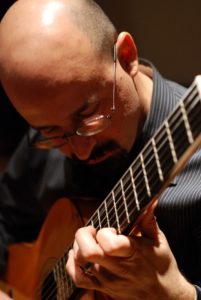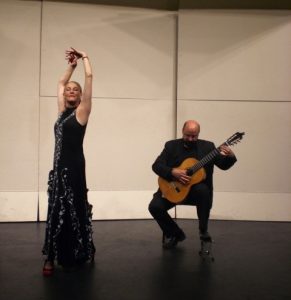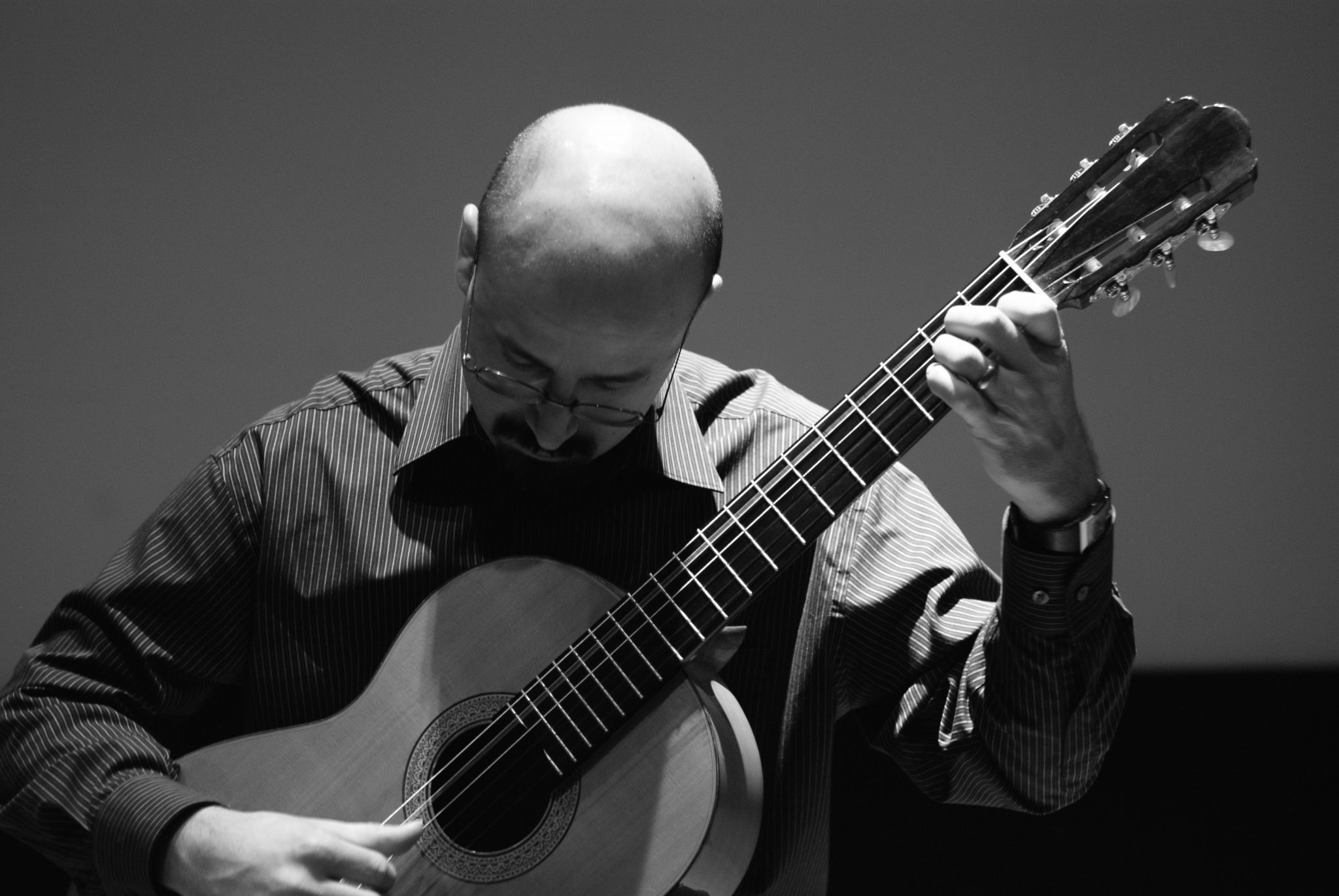My Music. My Story. is one of Classical Music Indy’s initiatives to feature music, musicians, and music lovers in a fun way. In honor of National Hispanic Heritage Month, we spoke with a regular Classical Music Indy performer, John Alvarado. He is the President of the Indianapolis Society of the Classical Guitar and a Senior Lecturer for the Department of Music and Arts Technology at IUPUI. John remarks about his own upbringing, how his study of Latino culture has influenced his work, and gives insight on how music, culture, and community are all intertwined.
John Alvarado: My Music. My Story.
What is your favorite kind of music and why?
 My favorite kind of music is less about a genre and more about a sense of creative exploration. I am really beginning to believe that genres have more to do with marketing than art. They often serve more to limit artists and audiences than anything else. An album that I am listening to non-stop is Spain Again by flamenco guitarist Tomatito and jazz pianist Michel Camilo. The two combine their backgrounds to perform compositions as varied as the works of modern tango composer Astor Piazzola, a song by Carlos Gardel (the Frank Sinatra of Argentina), jazz compositions by Chick Corea and Victor Young, as well as some originals composed for the album. I really love artists who have very strong backgrounds and understandings of their musical traditions but are not afraid to step beyond the confines of genre to explore new sounds.
My favorite kind of music is less about a genre and more about a sense of creative exploration. I am really beginning to believe that genres have more to do with marketing than art. They often serve more to limit artists and audiences than anything else. An album that I am listening to non-stop is Spain Again by flamenco guitarist Tomatito and jazz pianist Michel Camilo. The two combine their backgrounds to perform compositions as varied as the works of modern tango composer Astor Piazzola, a song by Carlos Gardel (the Frank Sinatra of Argentina), jazz compositions by Chick Corea and Victor Young, as well as some originals composed for the album. I really love artists who have very strong backgrounds and understandings of their musical traditions but are not afraid to step beyond the confines of genre to explore new sounds.
What does music mean to you?
To me, music is quite simply one of our greatest means of human expression. Every culture in every part of the world in every known period has created music. Some researchers have even gone so far as to suggest that in some cultures music may have pre-dated spoken language. We have created music that expresses every possible human emotion, from joy to sorrow, anger to love, and excitement to peacefulness. To me, music means anything and everything that we have to express as human beings.
How has music influenced your life?
Music, and the guitar specifically, has easily been one of the single greatest influences on my life. It has given me a means to express myself as well as support my family, and it has been a life shaping experience for as long as I can remember. My father played guitar and some of my earliest memories are of sneaking his guitar out of its case and pretending to play when he was gone. When I was in high school I had no intention of going to college. But my parents were desperate to find a way to convince me to go, so they discovered that I could study guitar and I was sold! I love sharing music with my family and my friends.
You were a recipient of a Creative Renewal Fellowship with the Arts Council of Indianapolis and used the opportunity to study Flamenco guitar music in Spain. How did that experience impact your life and career?
The opportunity to travel to Spain and experience flamenco in the place of its birth has been a highlight of my career. It was a life changing experience and I think I am still unpacking all the ways in which it has influenced me. Flamenco is an art form that is very closely tied to the people and places in which it was created. Many of the forms are so specific to their regions that the names come from the cities in which they were developed such as the Sevillanas, the Fandangos de Huelva, and the Granadinas, etc. So to be able to visit these places and experience first-hand the culture that gave them birth gave me an even greater appreciation for the sound and expressive content.
How do you think music benefits the community?
Music benefits the community in so many different ways, it can fill so many different roles. One of my personal favorite roles that music plays is in giving us a window into other cultures. There is a reason why almost every cultural festival you attend has a music performance stage and highlights the musical gifts of each of the representative cultures. Every culture produces music, and every culture’s music tells us something about their values, their aesthetics, and their humanity. I love using this art form to combine my interests in sharing culture along with music.
How has your knowledge of the Spanish language and immersion in Latino culture impacted your interpretations of classical guitar music?
I think music and culture are inseparable. So, the more you can learn about the culture of the music you are studying the more deeply you can appreciate it and the more sensitively you can interpret it. I did not grow up speaking Spanish. My father grew up speaking Spanish in his household and he has told me about the challenges he faced when he started school and had to start speaking English. So, I think he really wanted to make sure his children did not have that same challenge. I chose to learn Spanish later as I became more and more interested in the music and culture of Spain and Latin American countries. So for me the study of the music and the language has gone hand in hand. Interestingly, the study of the two really support each other and many of the pedagogies are transferable between the two.
If you could fuse together any two genres of music, which ones would you fuse?
 I think there are two different pairs I would love to see combined. I would love to see a combination of flamenco and the blues. Both of these traditions have so much in common. Both were developed by oppressed minority populations as a means of expressing their angst in the face of their situations. Both styles came to be embraced by the very populations that had originally been the oppressors. In many ways, it seems like a no brainer to try to combine the two and see what would happen. On the other hand, I would also love to see more fusing of electric guitar with the solo, compositional approach of classical guitar. It has always bothered me that in so many music schools the default assumption is that jazz guitar = electric guitar and classical guitar = acoustic, nylon stringed instruments. Why should we be limiting ourselves this way?
I think there are two different pairs I would love to see combined. I would love to see a combination of flamenco and the blues. Both of these traditions have so much in common. Both were developed by oppressed minority populations as a means of expressing their angst in the face of their situations. Both styles came to be embraced by the very populations that had originally been the oppressors. In many ways, it seems like a no brainer to try to combine the two and see what would happen. On the other hand, I would also love to see more fusing of electric guitar with the solo, compositional approach of classical guitar. It has always bothered me that in so many music schools the default assumption is that jazz guitar = electric guitar and classical guitar = acoustic, nylon stringed instruments. Why should we be limiting ourselves this way?
Any other stories or thoughts on music and community?
One of the things that I have loved about working in Indy has been the opportunity to partner with groups to take classical guitar to places it may not usually be heard. That is one of the reasons I love partnering with Classical Music Indy, I love the mission of bringing classical music to public spaces and people that might not otherwise hear it. We constantly hear people fretting over the death of classical music and I don’t really worry about that very much. I have found at these non-traditional performance spaces that people love the music. The idea of sitting in a formal space, having to be quiet, observe customs they are unfamiliar with, etc., that is what keeps them away, not the music. I still love the classical concert venue tradition myself, but I also realize that if we want to share this art form with more people than we need to bring it to them and meet them halfway. We can do both, we can have our formal concerts and recitals and we can also go play in a tequila bar or a street corner or any other space where new listeners can be found. There is no one right way to enjoy classical music.
To learn more about John Alvarado, visit his website or follow him on Facebook. To learn more about the Indianapolis Society of the Classical Guitar find follow them on Facebook or visit their website.







Leave a Reply